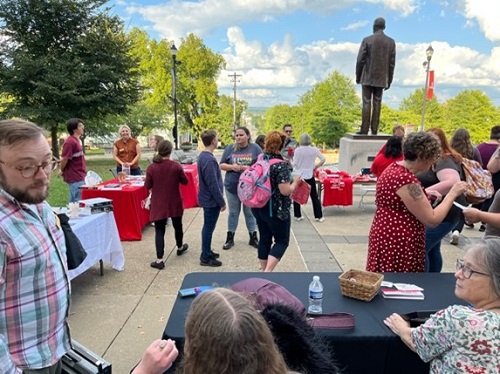WKU Dept of English Hosts Convocation
- Macy Kitchens
- Friday, September 15th, 2023

The WKU English Department held its 7th annual English Convocation on Friday, September 8, in Cherry Hall. The annual event brought together faculty, students, and alums of the Department of English for an opportunity to learn more about each other and the department.
The convocation began with the department faculty introducing themselves, and PCAL Dean Dr. Terrance Brown shared his views on the importance of studying English in today’s world. Following Dr. Brown’s speech, the department advisors introduced the majors and minors of the programs. Then, current students and alums discussed some of the opportunities within the department, including the Professional Writing Club, ran by professional writers at Kirkpatrick Price; Sigma Tau Delta, the International English Honor Society; and Zephyrus, WKU’s annual fine arts magazine. Representatives from the different clubs and activities explained their organization and how to get involved.
Throughout the convocation, students had the chance to win raffle prizes, including department swag and gift certificates to Starbucks, Spencer’s Coffee, and Meltdown Ice Cream & Soda Fountain. Some students won books by English department faculty. “What Feels Like Love: New and Selected Poems” by creative writing professor Dr. Tom Hunley and “The Finalists” by Dr. David Bell, another creative writing professor, were a couple of the books that were up for grabs. Dr. Alison Langdon, Department Head, said that giving away the prizes was her favorite part of the convocation.
Dr. Langdon said that her hope for the convocation was that it inspired students to get involved more. “Most of the research shows that the students who are involved in something extracurricular tend to have a better college experience overall,” Dr. Langdon said. She said that one of the biggest goals of the convocation was to let students know the different kinds of opportunities available to them.
Christian Butterfield, a Creative Writing junior, said that the convocation was a convenient way to learn about the different opportunities in the department. Hearing from representatives from the different clubs and activities was a great opportunity for people new to the major to learn “just how accessible it is,” Butterfield said. “Sometimes these clubs can feel intimidating. [The convocation] offers a more human face and makes it a lot more approachable,” he said.
After the clubs, activities, and opportunities portion of the event, the convocation moved outside to a more interactive format where people had the chance to mingle, and students had the chance to get to know the professors. Outside Cherry Hall, professors had items representing some of their interests. Among the items were a typewriter, a Lego flower, a model of the human brain, and a puppet raven. Students were given bingo sheets with clues to the items. They then had to go to the professors and see if they got their clue/item pairing correct. This format allowed students to interact with and learn more about the professors in the department. “It gets the students talking to professors, some of them they might have had, some they might not know yet,” Dr. Langdon said.
Dr. Jane Fife, a Professional Writing professor and Director of the WKU Writing Center, said that the bingo game allowed students and faculty to get to know each other on a more personal level. “[You get to] find out that people are more than whatever they are in the classroom,” she said. “It’s so important to get to learn other people's names and faces and things about them that you wouldn’t necessarily learn in class.” Dr. Fife also said the Convocation gives students and faculty the chance to “enjoy geeking out over commonly shared favorite things.”
Chesney Wright, a junior Creative Writing student, similarly enjoyed the chance to “goof off” with everyone at the convocation. “We analyze so much literature that actually being able to joke around with people that we have to analytically talk with every single day has been really nice,” Wright said.
These interactions between students and between students and professors showcased the purpose of the convocation. At its core, the convocation was an event built to foster community. “It brings us together, not just as a department but as a community,” Wright said. Dr. Langdon rearticulated this sentiment: the convocation helps build community because it gives people the opportunity to connect—to create a “human connection.” But perhaps the convocation can best be summed up by a statement Dr. Brown made at the beginning of the event: “Your family is who you make them; I guarantee you that in this room, you’re going to find community and belonging.”
Some of the links on this page may require additional software to view.

